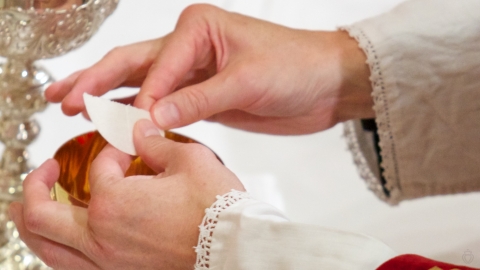The Case of Vincent Lambert: Euthanasia Under Another Name (4)
The French government has appealed the decision of the Court of Appeals of Paris which had ordered the resumption of nutrition and hydration for Vincent Lambert. After the medical, legal, and ethical aspect of this decision, let us finish with a treatment of the moral aspect.
As said in the preceding article, the term “moral” is more specifically reserved for the teachings of the Church on moral matters. It is at least under this sense that we are concluding these considerations on euthanasia.
Moral Theology
Moral theology considers moral materials from the theological point of view. Theology is the science that has God Himself for its object. Under this qualification, one could say that it only considers God, who is its primary object. That being said, it also studies creation, the universe, angels, men, but always in relation to God, and in reference to that which God has revealed about Himself. Such is the nobility of Catholic theology.
The work of theology is a speculative one which employs numerous intellectual resources in view of obtaining a better rational comprehension of divine revelation, without, however, ever being able to exhaust it. Theology explores, deduces, coordinates, and deepens revealed elements, but always under the bright light which has been communicated by God from the beginning, and especially by Jesus Christ, the Prophet par excellence.
The moral part of theology treats the end, the goal of human life, and the means necessary to attain it. Our end is eternal life with God. This end, the Good, that we must seek to attain here on earth, is obtained through the grace of God and through our cooperation with this grace, essentially through the virtues. Firstly, there are the theological virtues of faith, hope, and charity. Following are the moral virtues which regulate our actions regarding the realities of this world: prudence, justice, fortitude, and temperance—the principles upon which all the others are dependent.
The Teachings of the Church
The teachings of the Church in matters of faith and morals is call the “Magisterium” to signify that it is imposed upon the faithful through authority, following degrees among which the most elevated is infallibility. This authority, when it respects the conditions of its mission, is the same as that of God: “He that heareth you, heareth me; and he that despiseth you, despiseth me; and he that despiseth me, despiseth him that sent me” (Lk. 10:16).
The Church has rich and vast teachings in the areas of human life, which she imposes with greater or lesser insistence on Catholic consciences. But it is not only and particularly divine authority that is expressed through its Magisterium, and which give worth to this teaching, but also the rational value that she possesses, which is accessible to every mind. So it is that the Church is the guardian of the natural law just as much as the supernatural law.
Human Dignity
Reason is able to discover the existence of God by itself; it can even raise itself up to the idea of creation. But only faith teaches us that man is created in the image and likeness of God (cf. Gen. 1:26). It is the highest foundation of human dignity. To measure the profundity of this dignity, we must consider that man is called to become a child of God through grace and to live eternally with Him, if he is faithful to the gift of God.
This dignity of the children of God, whether it be in act or only in hope, makes us understand the supreme commandment of Christ, that of charity: we must love God above every thing and our neighbor as ourselves. This commandment has been stated in a particular way by the One who will judge all of us, “as long as you did it to one of these my least brethren, you did it to me” (Mt. 25:40).
This explains the extraordinary outpouring of charity throughout the centuries and the innumerable religious foundations for the care of the most vulnerable and the weakest: children, orphans, the sick, the infirm, prisoners, slaves, the destitute, the old, the ignorant. All the misery of the world has been succored by the Church, through the multiple religious works and institutions. Christ’s commandment did not remain vain.
The fact of creation implies that man does not belong to himself, as is thought by liberalism imbued with a false freedom. Man is a creature who belongs to God who gave him life; man is only the beneficiary. That is why he cannot in any way dispose of it as he sees fit. Our neighbor’s life does not belong to us, which is recalled by the fifth commandment: “Thou shalt not kill.”
God wants us to conduct ourselves according to the light of our reason enlightened by faith. The dogma of creation teaches that we depend entirely on God. This dependence is frequently manifested in both the Old and New Testaments. This is a new reason which adds to the previous one for us to forbid all attacks against innocent human life.
Let’s make a digression to deal with an objection: does this mean that God prohibits the death penalty? No. Because civil society, which is also created by God, has the duty to defend itself and to protect its members. This is the point that puts into play the difference between radical human dignity, which is possessed by the mere fact of having a human nature, and operative human dignity, which depends on our actions, good or bad. He who defends his country at the risk of his life must be honored and rewarded; he who loosely takes innocent lives dishonors himself and must be punished, without excluding the death penalty.
The Natural Law
This law, about which we spoke briefly in the third part, has been recalled and confirmed to us by God in the Ten Commandments given to Moses on Mount Sinai. It derives from the eternal law found in God; it is none other than God Himself giving His law to the universe He has created.
But this law makes it our duty to preserve, as far as possible, this life given by God, and to fight against whatever opposes it. Which means that we must employ, according to circumstances of time, place, resources, and relief, the necessary means for the preservation of life. This affirmation immediately opens a crucial question, the resolution of which is the principal key of our question.
Here is the question: we are required to preserve life and health, but up to what point? For example, are we obliged to use all the resources that a health system can provide at a given time? Or can we instead make a choice, refuse what we do not like or what bothers us?
The question specifically regarding resuscitation was put to Pope Pius XII, who answered it in his Address to an International Congress of Anesthesiologists, on November 24, 1957. Here is the important passage: “Natural reason and Christian morals say that man (and whoever is entrusted with the task of taking care of his fellow man) has the right and the duty in case of serious illness to take the necessary treatment for the preservation of life and health. This duty that one has toward himself, toward God, toward the human community, and in most cases toward certain determined persons, derives from well ordered charity, from submission to the Creator, from social justice and even from strict justice, as well as from devotion toward one's family. But normally one is held to use only ordinary means (according to circumstances of persons, places, times, and culture), that is to say, means that do not involve any grave burden for oneself or another…On the other hand, one is not forbidden to take more than the strictly necessary steps to preserve life and health, as long as he does not fail in some more serious duty” (L'Osservatore Romano, November 25-26, 1957).
Ordinary and Extraordinary Means
This distinction sheds a light on the situation that makes it possible to put in place, at least from a theoretical point of view, a solution to the difficulty. But we must well understand the terms, at the risk of mixing up everything. Every man is bound to ordinary means; he must use them. To refuse to do so would be to shirk divine command and right reason. But he is not obliged to use extraordinary means, even if he is permitted to use them. That seems clear. But the question remains: how does one determine if a means is ordinary or extraordinary?
A first distinction must be made between the objective and the subjective aspects. A means that will appear—and in reality will be—ordinary to one, will not be for another, from a purely subjective point of view, and this for very different reasons and which may be, for some, very unreasonable. But medicine treats people whose will must be respected within the usual limits of morality. The fact remains that there may be difficult situations, where a refusal amounts to virtual suicide, for example with a person who would be able to live for a long time to come.
As for the objective aspect, let us first remember that, in order to decide a difficult question in any field, the first step should be to seek advice from someone prudent and competent in that field. If we want legal advice, we turn to a man of law, for construction advice, to an architect. Here, the doctor is the prudent man, even if it is not true of all doctors. Still, many doctors are competent and prudent in their field.
Let us return to the distinction between ordinary and extraordinary means. Here are some elements that come into play:
1. The degree of the complexity of the proposed treatment. This is the difference between an appendectomy and cardiac surgery for malformations in the newborn.
2. The risk. A treatment that poses a major risk to the patient’s life with a 50% or more chance of death, is unquestionably an extraordinary means.
3. The cost. This can vary significantly from one country or continent to another. In France, the reimbursement of care is one of the highest in the world, but this is not the case everywhere. Not to mention the side-effects that can weigh on a modest budget.
4. The possibilities of application or feasibility. This is the difference between an outpatient treatment, which is done from a doctor’s office or medical center, and one that requires a more or less long hospitalization.
5. The expected result. What benefit will the patient receive from the treatment received? The latter will in particular be as compared to other elements such as risk, difficulty, and the condition of the patient.
6. The duration. Time is to be taken into account especially in treatments that are long and probably painful. For example kidney dialysis is a suitable treatment, with little risk, low cost, feasible even at home, but quite painful in the long term. Some may grow weary, knowing that stopping dialysis will be punished by a relatively rapid death.
7. The state of the patient from a physical and moral point of view. It is not useful to provoke a painful and grueling treatment, which will bring only a slight reprieve, in a person whose strength makes it possible to foresee death in a relatively short time. This brings us closer to the subjective criterion.
It must be added that the overall judgment as to what to do can vary—as Pius XII so aptly put it—“according to circumstances of persons, places, times, and culture.” This means that an ordinary means, hic et nunc, here and now, in our industrialized country, endowed with a very developed health care service, can very well become extraordinary at another point on the planet; or, again, that a means considered extraordinary 20 or 30 years ago can be considered ordinary today. It’s a matter of circumstances, which is normal in the moral domain.
Thus, the distinction between ordinary and extraordinary means is determined by the will of the patient. But it shows the limits of “advance directives” which can only give a general indication. For it is only in the concrete situation that we can judge whether a means is ordinary or extraordinary. That is why these directives represent a danger. In fact, they were introduced as a Trojan horse to promote euthanasia.
The distinction between ordinary and extraordinary means is also a right to deny extraordinary treatment, at least if it is really is such. We are always free to refuse treatment that requires extraordinary means. Thus, in the case reported in Part 2 (Karen Quinlan), the parents who asked for the removal of the respirator made a completely moral request. And the responsible sister who refused to do so should have taken the time to read Pius XII.
Let’s give another, last example. An artificial respirator can be an extraordinary means if it keeps a dying person alive. It is then allowed to stop it, after the patient has been sedated: all this is explicitly indicated by Pope Pius XII. But this respirator can also be an ordinary way. For example, Guillain-Barré syndrome is quite easily complicated by transient respiratory paralysis, lasting a few days to a few months, requiring the use of a respirator. Recovery rarely leaves after effects. It is clear in this example that one is bound to take this means.
Conclusion
There is no need to be Catholic to understand this distinction, nor to realize that food can never be included among the extraordinary means. We are all required to feed ourselves and those who depend on us. So the caregivers—the parents of a person unable to feed himself, like the doctors and the politicians who turn up to make a pronouncement about it—have a duty to do their best to provide food to those who depend on them.
Thus considered, Vincent Lambert’s case appears to be persecution by the political and judicial system, which clearly has in view a change in the current law, for various reasons, in order to promote the frank and decisive adoption of euthanasia. It remains to oppose it, both legally and morally, with the weapons of intellectual combat by resorting to real arguments, without omitting the most powerful weapon: prayer.
(Source – FSSPX – FSSPX.Actualités – 06/14/2019)



